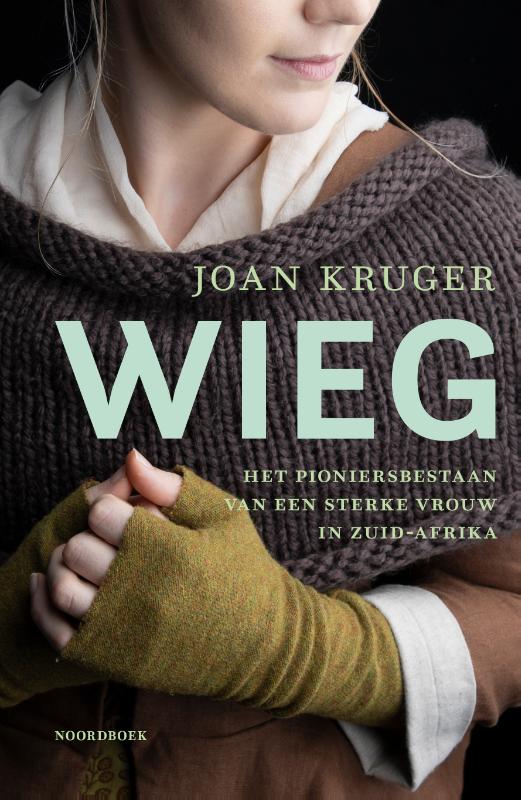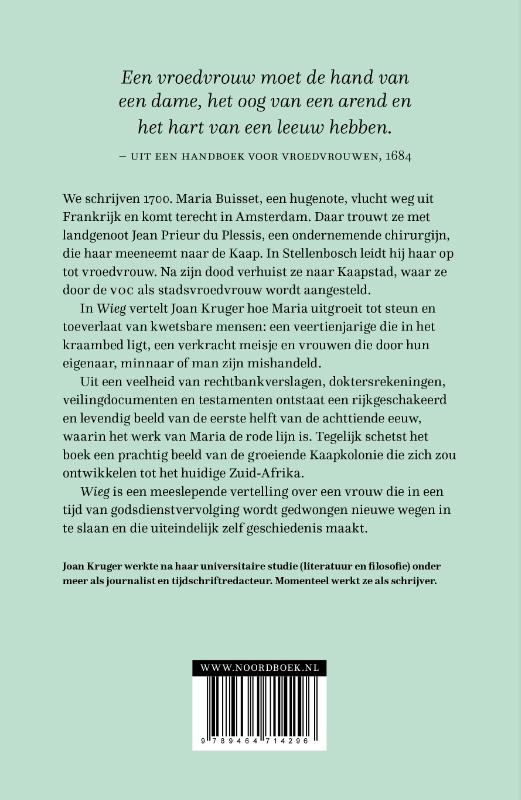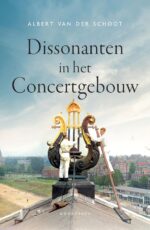Wieg
€ 29,90
‘Een vroedvrouw moet de hand van een dame, het oog van een arend en het hart van een leeuw hebben.’
– Uit een handboek voor vroedvrouwen, 1684
We schrijven 1700. Maria Buisset, een hugenote, vlucht weg uit Frankrijk en komt terecht in Amsterdam. Daar trouwt ze met landgenoot Jean Prieur du Plessis, een ondernemende chirurgijn, die haar meeneemt naar de Kaap. In Stellenbosch leidt hij haar op tot vroedvrouw. Na zijn dood verhuist ze naar Kaapstad, waar ze door de VOC als stadsvroedvrouw wordt aangesteld.
In Wieg vertelt Joan Kruger hoe Maria uitgroeit tot steun en toeverlaat van kwetsbare mensen: een veertienjarige die in het kraambed ligt, een verkracht meisje en vrouwen die door hun eigenaar, minnaar of man zijn mishandeld.
Uit een veelheid van rechtbankverslagen, doktersrekeningen, veilingdocumenten en testamenten ontstaat een rijkgeschakeerd en levendig beeld van de eerste helft van de achttiende eeuw, waarin het werk van Maria de rode lijn is. Tegelijk schetst het boek een prachtig beeld van de groeiende Kaapkolonie die zich zou ontwikkelen tot het huidige Zuid-Afrika.
Wieg is een meeslepende vertelling over een vrouw die in een tijd van godsdienstvervolging wordt gedwongen nieuwe wegen in te slaan en die uiteindelijk zelf geschiedenis maakt.
Joan Kruger werkte na haar universitaire studie (literatuur en filosofie) onder meer als journalist en tijdschriftredacteur. Momenteel werkt ze als schrijver.
Gerelateerde boeken
-
Onderweg naar 1832
€ 22,50Onderweg naar 1832 vertelt het verhaal van zes jonge mensen uit eenvoudige milieus, met ieder een bijzondere geschiedenis. Twee vrouwen en vier mannen, van wie één met Joodse migrantenwortels. Het speelt tegen de achtergrond van de schoolwereld uit de vroege negentiende eeuw en loopt vanaf hun kindertijd tot 1832. In dat jaar waren ze als dertigers aanwezig op een legendarisch jubileumfeest ter ere van hun onderwijsinspecteur. Ze hadden toen, gegeven hun afkomst en sekse, binnen het onderwijs opvallend carrière gemaakt. Op basis van historische bronnen laat het boek zien hoe dit kwam en wat ze onderweg naar 1832 meemaakten.
Samen geven de zes biografische verhalen een beeld van vroege ontwikkelingen binnen het lerarenberoep. Onderwijsvernieuwing was in deze periode het sleutelwoord. Geleidelijk nam daardoor de vakbekwaamheid toe, verbeterden de arbeidsomstandigheden en steeg het sociale aanzien van de beroepsgroep – maar alleen voor de mannen. Het boek maakt ook de onontkoombare man-vrouw verschillen van deze periode zichtbaar.
De jonge levens van de zes speelden zich grotendeels af in de stad Groningen, toen een belangrijk centrum van onderwijsvernieuwing. Ze stonden in de voorhoede van de nieuwe Nederlandse school. Het boek vertelt de nauw met elkaar verweven verhalen over deze bijzondere pioniers: een idealistische dovenonderwijzer, de ontwerper van de pabo, Nederlands eerste kleuterpedagoge, een talenvirtuoos die botste op de grenzen van de tolerantie, een heel vroege carrièrevrouw, en de wegbereider van de Algemene Onderwijsbond (AOb). Ingekleurde momentopnamen van opvallende gebeurtenissen in hun bestaan – een dramatische vergadering, een liefde, een stedentripje naar Amsterdam, een onvergetelijke les – brengen de personen tot leven. Een bijzondere combinatie van feiten en fictie.
Mineke van Essen is historisch pedagoog en emeritus hoogleraar van de Rijksuniversiteit Groningen.
-





